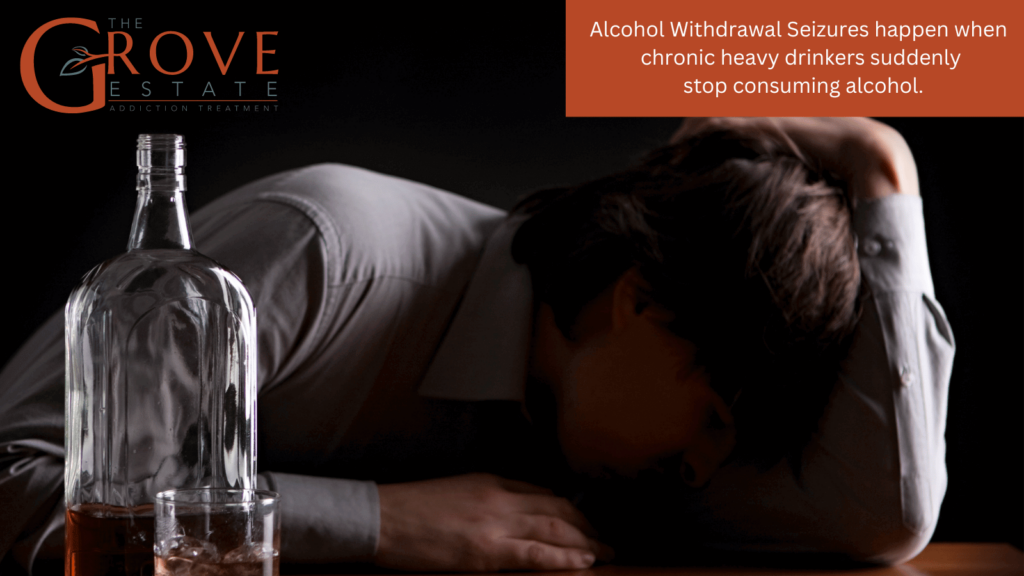Alcohol withdrawal seizures are a severe manifestation of alcohol withdrawal syndrome (AWS), primarily caused by the abrupt cessation or significant reduction of heavy and prolonged alcohol use. According to the National Institute on Alcohol Abuse and Alcoholism, around 3-5% of individuals with alcohol dependence experience withdrawal seizures. These seizures usually manifest within 6 to 48 hours after the last alcohol consumption.
The cause of these seizures lies in the brain’s adaptation to the continuous presence of alcohol; the nervous system adjusts to the depressant effects of alcohol by increasing its excitatory neurotransmitter activity. When alcohol is suddenly removed, the heightened excitatory state leads to neurological hyperactivity, resulting in seizures. This condition underscores the critical need for understanding the physiological impact of alcohol dependency and the importance of medical supervision during withdrawal, to prevent and manage such life-threatening complications effectively.

What Causes Alcohol Withdrawal Seizures?
Alcohol Withdrawal Seizures happen when chronic heavy drinkers suddenly stop consuming alcohol. Their brains, accustomed to the depressant effects of alcohol, experience a rebound in excitatory neurotransmitter activity. This abrupt shift leads to heightened neural activity, causing withdrawal symptoms that can include seizures. The severity of these symptoms is influenced by the individual’s drinking history, health, and concurrent medical conditions.
These seizures are a symptom of alcohol withdrawal syndrome (AWS), a condition that can arise when a person who has been drinking excessive amounts of alcohol regularly suddenly stops or significantly reduces their alcohol consumption. The seizures typically manifest as convulsions or episodes of shaking and can vary in severity.

Why Does Alcohol Withdrawal Cause Seizures?
Alcohol withdrawal induces seizures due to its significant impact on brain function. Chronic alcohol use depresses the central nervous system, leading the brain to compensate by increasing excitatory neurotransmitter activity. When alcohol is suddenly removed, this compensation results in excessive neuronal firing and hyperactivity, leading to seizures. This abrupt change disrupts the brain’s chemical balance, making it prone to the uncontrolled electrical discharges that cause seizures. Several factors heighten the risk of seizures during alcohol withdrawal including:
- Duration and Intensity of Alcohol Use: Long-term heavy drinking significantly increases the risk of seizures during withdrawal.
- Genetic Predisposition: Individual genetic factors can influence susceptibility to withdrawal seizures.
- Overall Health: Poor health and co-existing medical conditions can exacerbate the risk of seizures.
- Underlying Neurological Conditions: Pre-existing brain disorders or injuries can heighten seizure susceptibility during withdrawal.
- History of Withdrawal Episodes: Individuals with previous episodes of alcohol withdrawal are more likely to experience seizures in subsequent withdrawal periods, a process known as kindling.
What are the Risk Factors for Alcohol Withdrawal Seizures?
Alcohol withdrawal seizures are not only a medical emergency but also a significant indicator of the severity of alcohol dependence and the body’s reliance on alcohol to maintain neurological balance. The following are key risk factors that contribute to the likelihood of experiencing seizures during the withdrawal process:
- History of Alcohol Withdrawal Seizures: Those who have had seizures during previous withdrawal attempts are at increased risk.
- Quantity and Frequency of Alcohol Consumption: Regular consumption of large amounts of alcohol significantly raises the risk.
- Duration of Alcohol Dependency: Long-term alcohol dependence is a strong predictor of withdrawal seizures.
- Co-existing Medical Conditions: Conditions such as liver disease, electrolyte imbalances, and brain disorders increase seizure risk during withdrawal.
- Use of Other Depressant Drugs: Concurrent use of drugs that depress the central nervous system can exacerbate withdrawal symptoms and seizure risk.
What is The Kindling Effect in Alcohol Withdrawal?
The kindling effect in alcohol withdrawal signifies the increased severity of withdrawal symptoms, including seizures, after each detoxification cycle. This results from the brain’s heightened sensitivity following repeated alcohol exposure and withdrawal, leading to a lower seizure threshold and more intense withdrawal experiences.
Understanding kindling is crucial in treating alcohol dependence, as it highlights the risk of progressively worse withdrawal symptoms with each episode. This knowledge stresses the need for early, effective treatment strategies to break the cycle of alcohol abuse and withdrawal, reducing the risk of severe withdrawal effects in subsequent attempts to quit.
What are the Stages of Alcohol Withdrawal?
The stages of alcohol withdrawal are categorized based on the timeline and severity of symptoms, with the risk of seizures varying across these stages.
- Early Stage (6-12 hours after last drink):
- Symptoms include anxiety, insomnia, nausea, abdominal pain, and tremors.
- This stage is generally mild but can already hint at the severity of the subsequent withdrawal.
- Peak Stage (12-48 hours after last drink):
- Symptoms escalate to include increased blood pressure, rapid heart rate, confusion, and excessive sweating.
- Seizures are most likely to occur during this stage, especially within the first 24 hours.
- Late Stage (48-72 hours after last drink):
- This stage can involve delirium tremens (DTs), characterized by severe agitation, fever, hallucinations, and seizures.
- The risk of seizures remains high, and medical monitoring is crucial.
Understanding these stages helps in managing the withdrawal process effectively and preparing for potential complications like seizures, which are most likely during the peak stage, requiring close medical supervision.
What is the Relationship Between Delirium Tremens (DTs) and Seizures?
Delirium Tremens (DTs) is a severe alcohol withdrawal condition that manifests in individuals who suddenly stop heavy drinking. DTs result from the brain’s extreme reaction to alcohol absence, necessitating urgent medical treatment. Delirium Tremens (DTs) and seizures are often interrelated, with DTs representing the peak of withdrawal severity. Seizures can occur as part of the DTs symptom complex or independently during the alcohol withdrawal process.
DTs typically manifest 48 to 72 hours after the last drink but can occur later. Symptoms include severe confusion, disorientation, hallucinations (visual, auditory, or tactile), high blood pressure, heavy sweating, fever, and rapid heart rate. Patients may also experience severe agitation and sleep disturbances.
Treatment involves immediate medical attention in a controlled environment, often requiring hospitalization. Benzodiazepines are the first line of treatment to reduce withdrawal symptoms and prevent seizures. In addition to medication, patients may need intravenous fluids, electrolyte correction, and treatment of concurrent medical issues. Close monitoring is essential to manage the potential complications, including seizures, which can occur during the DTs phase.
How Are Alcohol Withdrawal Seizures Managed and Treated?
Managing and treating alcohol withdrawal seizures involves specific medical interventions and a supervised detoxification process to ensure safety and effectiveness.
Medical Interventions for Managing Withdrawal Seizures
- Benzodiazepines: These are the first-line treatment for managing withdrawal seizures due to their sedative and anticonvulsant properties, helping to stabilize brain activity and prevent further seizures.
- Anticonvulsant Medications: In some cases, additional anticonvulsant medications may be used to control seizure activity, especially if the patient has a history of seizures or benzodiazepines are not sufficient.
- Vitamin Supplementation: Thiamine and other vitamins are often administered to prevent Wernicke-Korsakoff syndrome, a neurological disorder related to alcohol abuse.
- Medical Monitoring: Continuous monitoring of vital signs, fluid balance, and electrolyte levels is crucial to manage the acute phase of alcohol withdrawal and mitigate the risk of seizures.
Importance of Supervised Detoxification
Supervised detoxification is critical for safely managing alcohol withdrawal seizures, providing a controlled environment where medical professionals can promptly address any arising complications. This setting allows for the careful administration and adjustment of medications, such as benzodiazepines and anticonvulsants, to manage symptoms and prevent seizures. It also offers psychological support and counseling, aiding individuals through the withdrawal process and reducing relapse risks. Supervised detox facilitates the comprehensive care necessary to address and treat any co-occurring medical or psychiatric conditions, thereby improving the overall recovery process and outcomes.

How Can Alcohol Withdrawal Seizures Be Prevented Through Detox Strategies and Supportive Care?
To prevent alcohol withdrawal seizures, a comprehensive approach is essential, involving gradual alcohol tapering within a supervised detox program. This strategy ensures careful monitoring and control of withdrawal symptoms. Administering medications like benzodiazepines helps stabilize neurological functions and prevent seizures.
Essential elements of supportive care, such as maintaining hydration, providing nutritional support, and vigilant monitoring for any complications, are integral to a safe detoxification process. Together, these measures form a cohesive strategy to effectively reduce the incidence of seizures during alcohol withdrawal.
What are the Long-Term Health Implications of Alcohol Withdrawal Seizures?
The long-term health implications of alcohol withdrawal seizures include potential brain damage and cognitive impairments due to repeated seizures. Ongoing treatment for alcohol dependence is essential to prevent future withdrawal episodes and minimize the risk of lasting neurological damage. Managing alcohol dependence effectively reduces both the immediate risks associated with withdrawal seizures and the potential for long-term cognitive and neurological consequences.
How to Recognize and Respond to a Withdrawal Seizure?
Recognizing and responding to a withdrawal seizure is crucial in ensuring the safety and well-being of the individual experiencing it. This process requires quick recognition of the symptoms and knowledge of the appropriate steps to take during such an event. Here’s a detailed guide on how to manage the situation:
- Ensure Safety: Clear the area around the person to prevent injury from falls or contact with hard objects.
- Monitor and Support: Lay the person on their side to maintain an open airway and prevent choking, and stay with them to monitor their condition.
- Do Not Restrain: Avoid restraining the person or putting anything in their mouth, as this can cause injury.
When to Seek Emergency Medical Help
- Immediate Attention: Call emergency services if the seizure lasts more than five minutes, or if the person has difficulty breathing, regains consciousness and then has another seizure, or if it’s their first seizure.
- Medical Evaluation: Even if the seizure is brief, the individual should be evaluated by a healthcare professional to manage the underlying alcohol withdrawal and prevent future seizures.

How Do I Find Support and Resources for Alcohol Withdrawal?
Finding support and resources for alcohol withdrawal is crucial for a safe and effective recovery process. Here’s how to navigate this journey:
- Consult Healthcare Professionals: Start by talking to a doctor or addiction specialist who can assess the situation and recommend treatment options, including detoxification programs and medication management.
- Utilize Support Groups: Engage with support groups such as Alcoholics Anonymous (AA) or other recovery programs that offer community support and resources for individuals going through similar experiences.
- Explore Treatment Facilities: Consider inpatient or outpatient treatment facilities that specialize in alcohol withdrawal and recovery, providing medical supervision and counseling services.
- Access Online Resources: Utilize online platforms that offer information, support networks, and counseling services, which can be particularly useful for ongoing support and information.
- Seek Family and Friends Support: Don’t underestimate the value of support from family and friends, who can offer emotional support and encouragement throughout the recovery process.
Navigating alcohol withdrawal and recovery requires a comprehensive approach that includes medical, emotional, and community support to ensure a successful journey towards sobriety.
What are the complications of alcohol withdrawal seizures?
Complications can include injury during a seizure, status epilepticus (prolonged seizures), and increased risk of future seizures.
How do alcohol withdrawal seizures differ from other types of seizures?
These seizures are specifically triggered by alcohol withdrawal, unlike other seizures that may be caused by epilepsy or other neurological conditions.
Can alcohol withdrawal seizures recur?
Yes, individuals who have experienced withdrawal seizures are at risk of recurrence, especially if they resume heavy drinking and then again stop abruptly.
How long do alcohol withdrawal seizures last?
Alcohol withdrawal seizures typically occur within the first 48 hours after the last drink, but their duration can vary. Most seizures are brief, lasting a few minutes. However, the aftermath can feel prolonged due to confusion and disorientation that often follow the seizure. It’s crucial to address alcohol withdrawal under medical supervision to mitigate risks and manage symptoms effectively.
For those undergoing withdrawal, understanding the link between seizure activity and blood alcohol content can be instrumental in managing expectations and recovery. Additionally, considering a dual diagnosis treatment can help address underlying mental health issues that may complicate the withdrawal process.

Share This Post



